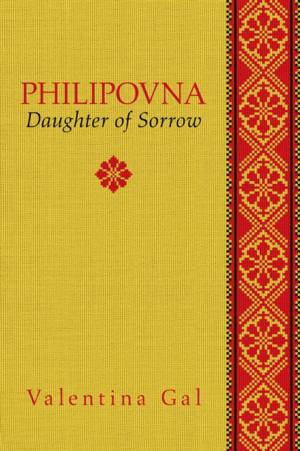
Door een staking bij bpost kan je online bestelling op dit moment iets langer onderweg zijn dan voorzien. Dringend iets nodig? Onze winkels ontvangen jou met open armen!
- Afhalen na 1 uur in een winkel met voorraad
- Gratis thuislevering in België vanaf € 30
- Ruim aanbod met 7 miljoen producten
Door een staking bij bpost kan je online bestelling op dit moment iets langer onderweg zijn dan voorzien. Dringend iets nodig? Onze winkels ontvangen jou met open armen!
- Afhalen na 1 uur in een winkel met voorraad
- Gratis thuislevering in België vanaf € 30
- Ruim aanbod met 7 miljoen producten
Zoeken
€ 32,45
+ 64 punten
Omschrijving
Philipovna: The Daughter of Sorrow is a creative non-fiction based on my mother's surviving the holodomor [the Ukrainian starvation] in the early 1930's. It is the story of an orphan who goes to live with her aunt in a rural village in the Ukrainian countryside. The aunt swears on her dead sister's Bible that Vera Philipovna, the daughter of a cobbler and seamstress from a small village in Chercassy, Ukraine will survive no matter what might befall the family. No one foresees the horrors that they will have to face between the fall of 1930 and the spring of 1933. In the end, out of a healthy extended family, only Philipovna, a cousin and the aunt survive. The acts of real savagery that are perpetrated on the village are unflinchingly narrated by a pre-pubescent girl, who also gives us a good grasp of the beauty and richness of the Ukrainian culture with its superstitions, customs and celebrations.
Specificaties
Betrokkenen
- Auteur(s):
- Uitgeverij:
Inhoud
- Aantal bladzijden:
- 285
- Taal:
- Engels
- Reeks:
Eigenschappen
- Productcode (EAN):
- 9781771833691
- Verschijningsdatum:
- 1/05/2019
- Uitvoering:
- Paperback
- Formaat:
- Trade paperback (VS)
- Afmetingen:
- 155 mm x 229 mm
- Gewicht:
- 362 g

Alleen bij Standaard Boekhandel
+ 64 punten op je klantenkaart van Standaard Boekhandel
Beoordelingen
We publiceren alleen reviews die voldoen aan de voorwaarden voor reviews. Bekijk onze voorwaarden voor reviews.











